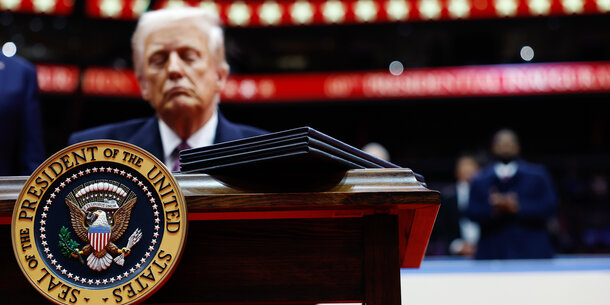In a shocking and lawless opinion, the Supreme Court granted presidents broad protections from criminal prosecution for “official acts” they undertake while in office. This ruling from the Court’s conservative supermajority pulls a new constitutional rule from thin air. And it raises daunting, unjustifiable barriers to criminally prosecuting lawbreaking presidents. Trump is now positioned to renew his push to dismiss the charges against him and evade accountability for the grave crimes he’s accused of committing against our democracy. The Court has left the rule of law in tatters — even as it looks the other way.
The Court’s 6–3 opinion — authored by Chief Justice John Roberts and joined by Justices Clarence Thomas, Samuel Alito, Neil Gorsuch, Brett Kavanaugh, and Amy Coney Barrett — attempts to set out rules to govern prosecutions of any and all future occupants of the Oval Office. Presidents, the Court rules, “may not be prosecuted for exercising [their] core constitutional powers, and [are] entitled to at least presumptive immunity from prosecution for [their] official acts.” The Court notes that presidents “enjoy[] no immunity for [their] unofficial acts, and not everything the President does is official.” But the latter assertion rings hollow in the context of the opinion that surrounds it. The Court has created an elaborate system of ambiguous rules that will not only ratchet up the complexity of the case against Trump but also erode the checks on presidential illegality. It is both a roadblock to prosecution and an encouragement to more insurrection.
Trump v. United States involves Trump’s prosecution in Washington, DC, for federal crimes stemming from his alleged plot to overturn the results of the 2020 election, a driving force behind the January 6 attack on the Capitol. Special Counsel Jack Smith charged that, as part of this conspiracy, Trump and his allies promoted false claims of election fraud, pushed state officials to ignore the results of the popular vote, organized slates of false Trump electors, pressured the Justice Department to conduct sham election-crime investigations, and tried to get Vice President Mike Pence to replace authentic electors with phony ones.
Trump tried to have the case tossed — or, at the very least, stalled until after the 2024 election — by arguing that presidents are absolutely immune from criminal prosecution for their official acts. After his arguments failed in the trial court and the appellate court, he brought it to the Supreme Court, which rewarded his transparent delay tactics and scorched-earth lawyering with an opinion that is shocking in both its substance and its effect.
The Court has held for the first time that presidents stand above the criminal law, a radical rejection of a bedrock part of the American legal and political tradition. The idea that lawbreaking presidents could be prosecuted was common sense to the Constitution’s framers, critical to the ratification of the Constitution in the late 18th century, and a background principle against which all presidents have done their jobs in the centuries since then. (Fifteen leading historians represented by the Brennan Center and our co-counsel at the law firm Friedman Kaplan made precisely this case in a friend-of-the-court brief this spring.) The Court has discarded all of this, fashioning a new constitutional rule from nothing.
The procedures the Court has crafted to go with it are pitched in Trump’s favor. Whenever the case returns to Judge Tanya Chutkan’s trial court, Trump will be presumed immune by default; the burden will be on the prosecution to establish that he isn’t. The Court’s definition of “official acts” cuts extremely broadly, stretching to “the outer perimeter of [Trump’s] official responsibility.” (The Court refused to say exactly where that perimeter ends.) The prosecution must show that prosecuting Trump for those official acts “would pose no dangers of intrusion on the authority and functions” of the presidency (emphasis added). The prosecution won’t be able to claim an official act was “unofficial” because of the president’s motives for doing it. And Trump can seek another round of appellate review if the trial court doesn’t rule him immune. Should the government clear these hurdles, it won’t be able to use the “testimony or private records of [Trump] or his advisors” about official acts to prove his guilt.
The Court justifies all this new complexity as necessary to protect imaginary future presidents from imaginary future prosecutions. It does not, critically, justify it as a response to the acts of the real and credibly accused former president in the case before it. Just as members of the Court’s conservative supermajority consistently steered the conversation at oral argument away from Trump’s charges, they do not even try to grapple with the bigger implications of applying their new rule to the case in front of them or the consequences if their rule ultimately lets Trump skate. Instead, the Court bows out of the case with the tidy but myopic claim that it “cannot afford to fixate exclusively, or even primarily, on present exigencies,” lest “transient results” threaten “the future of our Republic.”
The Court doesn’t engage with the ramifications of its opinion, because it can’t — at least not without exposing the fundamental bankruptcy of the whole edifice it has just built. The majority’s ruling cannot possibly be the rule for any functioning democracy. Trump has been charged with attempting to overthrow the election that threw him out of office. Any rule that would grant a president immunity for that crime would remove the principal check on presidential abuses of authority in our democratic system: the vote. And it would encourage other losing candidates to try the same in future elections. It is in this sense that the Court’s opinion is truly lawless. It does not merely invent constitutional rules that are antithetical to our founding commitments or enduring values. It threatens to free presidents from the constraints of law and democracy. And it paves the way for future presidents to try to make good on the most antidemocratic of all propositions: might makes right.
In reaching to resolve future imagined cases of presidential criminality while downplaying the actual criminality before it, the Court has imperiled accountability for Trump’s wrongs. It has done severe violence to our law. And it has left our democracy exposed.
Trump v. United States is not a serious opinion for a serious democracy. It is an epochal dereliction of duty.



